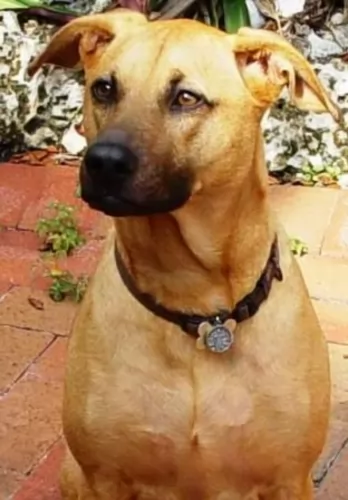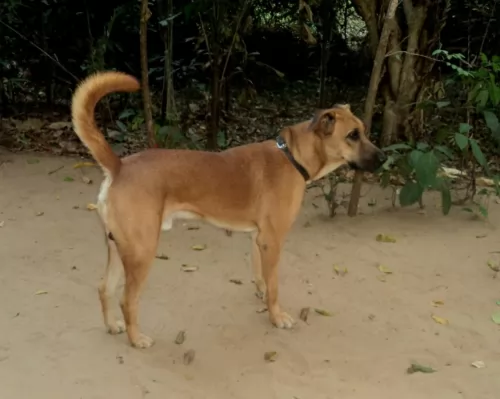 Petzlover
PetzloverCombai is originated from India but Kuri is originated from French Polynesia. Combai may grow 18 cm / 8 inches higher than Kuri. Combai may weigh 19 kg / 42 pounds more than Kuri. Both Combai and Kuri has almost same life span. Both Combai and Kuri has same litter size. Both Combai and Kuri requires Low Maintenance.
 The Combai is a dog from Tamilnadu, Southern India, developed to hunt dangerous animals by the Indian royalty. It is a rare breed in India, believed to be close to extinction.
The Combai is a dog from Tamilnadu, Southern India, developed to hunt dangerous animals by the Indian royalty. It is a rare breed in India, believed to be close to extinction.
The dog is also known as the Indian Bear Hound, Indian Bear Dog and Tamil Bear Hound. You can spell the name of the dog with a ‘C’ or a ‘K’, Combai or Kombai.
Accurate records as to the history of this dog haven’t been kept, so much of the dog’s history is on speculation, although it is believed with some certainty, that the breed has been around since the 15th century. It is thought that the Combai was developed from Mastiff-type dogs, Pariah dogs, the Thai Ridgeback and Khoisan dogs.
Kurī, also known as Guri or Peroor New Zealand Native Dog, is the Maori name for this dog which was introduced to New Zealand by the Maoris when they migrated from East Polynesia around 1280 AD.
They were in fact Polynesian dogs which died out in New Zealand. The Māoris would use the dog as a food source and the skins would be used to make some form of clothing. The bones were used to make items such as necklaces and fish hooks.
Not surprising then that the dog became extinct in New Zealand, with the last known Kuri specimens being found in the Museum of New Zealand Te Papa Tongarewa.
 The Combai is a medium sized dog, standing at between 43 to 64cm in height and weighing up to 34kg. Possibly the most distinctive feature of the Combai is a ridge of fur that runs down its back, with the hair growing in the opposite direction to the dog’s body hair. The coat of the dog is short and smooth with colors being brown, tan or reddish. The dog is medium sized, though size does vary quite a bit . The dog is muscular, lean and athletic with a long tail that curls over the back.
The Combai is a medium sized dog, standing at between 43 to 64cm in height and weighing up to 34kg. Possibly the most distinctive feature of the Combai is a ridge of fur that runs down its back, with the hair growing in the opposite direction to the dog’s body hair. The coat of the dog is short and smooth with colors being brown, tan or reddish. The dog is medium sized, though size does vary quite a bit . The dog is muscular, lean and athletic with a long tail that curls over the back.
The head of the Combai is fairly narrow with a muzzle which is quite long.The ears of the Combai vary as well and usually drop down or they fold backwards.
The Combai’s temperament is by no means gentle and it is believed to be a fierce, angry breed who will fight other dogs to the death.
It is sometimes hard to believe that the Combai, with training and socialization can make a good family pet. He then loves the company of his human family and remains loyal to them. When trained and socialized they also get on well with children in the home.
It isn’t recommended as a first dog choice for those who have never owned a dog as it does tend to be aggressive. The dog is also very territorial and alert and its why he makes a good watchdog.
The Kuri is extinct now but it was a small to medium sized dog with a thick set neck. He stood between 25 and 46cm and weighed about 13 to 15 kilograms.
He had thick medium-length rough textured hair, small head, erect ears, short legs and a bushy tail. The color of their weatherproof coats varied and some were black, some white or cream and some were a mix of colors and patterns.
An interesting feature about them is that they didn’t bark but instead they howled. They were good at hunting birds.
The Kuri wasn’t considered the brightest breed, but he would have benefited from some training and socialization as this just makes a dog a better pet in every sense – more obedient and better behaved in all situations.
Some Kuris were friendly and able to bond with their human owners, while others were independent and somewhat aloof. Their size would have allowed them to be kept in the city or the country as they weren’t particularly energetic dogs, not requiring much ground to run around in.
 The Combai is known for its bravery and fearlessness and this is what makes him such an exceptional watch dog as he also doesn’t take kindly to strangers.
The Combai is known for its bravery and fearlessness and this is what makes him such an exceptional watch dog as he also doesn’t take kindly to strangers.
The Combai is full of energy too and won’t like to spend days lying around. He will require regular exercise.
Have him trained and socialized and he becomes the most loyal and devoted pet and companion.
It appears as though some Kuris were kept as pets and that they were able to develop loving relationships with their owners.
We don’t know too much about the extinct Kuri, but scientists are now studying and analyzing the hairs of the dog to find out more about it, and specifically why the Maori dog disappeared some time in the 19th century without a trace.
They will also be analyzing Kuri bones salvaged by archaeologists and which were found on rubbish heaps. These bones can be tested to see whether the diet of the Kuri changed much between the days of Maori settlements and the arrival of the European settlers.
 Most dog experts will agree that the Combai is a breed that enjoys excellent health, and that in fact it seems as though the dog is disease- and parasite resistant.
Most dog experts will agree that the Combai is a breed that enjoys excellent health, and that in fact it seems as though the dog is disease- and parasite resistant.
There are however, always common dog illnesses that every dog owner should be aware of and it is always to a dog owner’s benefit to have their pet tested by Foundations such as the Orthopedic- and Canine Eye Registration Foundation who can perform tests to identify potential health defects before they show up.
Some of the ailments of concern in hounds include progressive retinal atrophy, demoid sinus and hip dysplasia.
The Retina is the light sensitive part of the eye and also part of the central nervous system. In retinal degeneration, the cells of the retina decline in function and this is what leads to possible blindness.
Progressive retinal atrophy worsens with time. If your pet doesn’t seem to react to light properly it may be wise to have him checked by the vet.
This defect is found in newborns as well as later on in life, and found primarily in Ridgeback dogs. Dermoid sinus is a neural tube defect that is typically found along your dog’s back, the tail and the neck.
The role of the tubes is to drain out dead cells for example. Not correctly formed, they become infected and an abscess forms with discharge. You will have to get your pet to the vet who will proceed with treatment as your pet can experience pain and discomfort.
Some Kuri dogs scavenged while others were pets and ate well. The lifestyle they led would have determined their health. In those days they would have suffered with dental disease, common in adult dogs. Left untreated, dental disease can lead to dental tartar buildup with gum inflammation and tooth loss.
Dental disease can also lead to other organ diseases. These days brushing your dog’s teeth with canine toothpaste and toothbrush can help to ward off dental disease.
Those Kuris that weren’t pets, tried to survive scavenging, and their homeless situation could well have led to ear infections – caused from a wax- and dirt buildup within the ear. He would have been frantic trying to scratch his ears. In modern times, if your dog showed signs of an ear infection, you would need to get him to the vet.
 The Combai is an active dog and he will require quite a bit of exercise. A good way of giving him exercise is to take him on walks or allow him to go jogging with you or cycling.
The Combai is an active dog and he will require quite a bit of exercise. A good way of giving him exercise is to take him on walks or allow him to go jogging with you or cycling.
Denying him exercise will make him frustrated and destructive. His high exercise needs mean that he won’t do well in small apartments but will do well in the suburbs or in the country.
With his short coat, the Combai is a low maintenance breed. This breed should never require professional grooming, only an occasional brushing. Other than that, he will require his nails being clipped, his ears checked for infection and his teeth cleaned 2 or 3 times a week.
High energy dogs like the Combai will require a top quality kibble diet recommended by your vet with raw meat included in his diet from time to time as well as nutritious cooked food added in such as brown rice, vegetables and cooked chicken. Fresh water must be available to him night and day non-stop.
The Kuri will have required regular grooming which means a brushing down twice a week. Brushing would have been useful to prevent loose hairs from shedding with the dog. He would have had to have his ears and eyes checked too to avoid infections. Brushing him would have given his owner the chance to check him over for fleas and ticks too.
As the Kuri wasn’t an overly energetic dog, a walk a day would have kept him content and fit.
The Kuri was a dog that essentially formed part of someone else’s diet. Those that managed to escape being a meal for someone no doubt had to scavenge for food. Because they were used to help people catch birds, they themselves were used to catching birds for themselves.
As a small to medium sized dog, if you were to keep such a dog as a pet you would have given him a cup or two of dried kibble a day and tried to vary his diet by including some home-cooked food and raw meat.